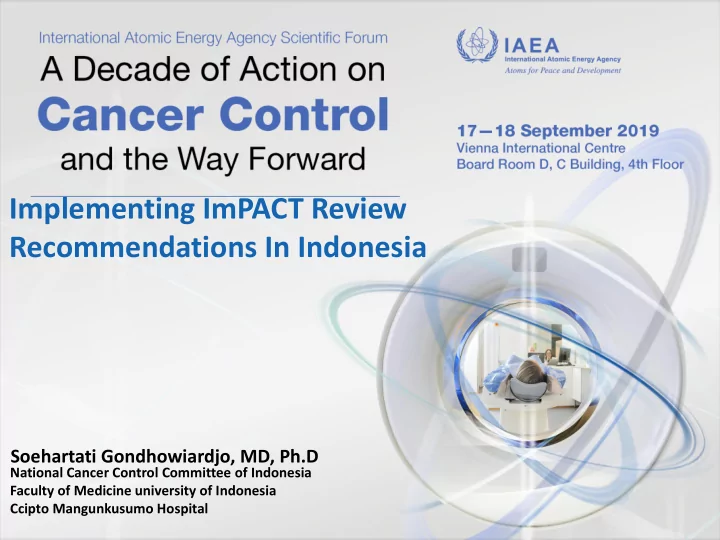

Implementing ImPACT Review Recommendations In Indonesia Soehartati Gondhowiardjo, MD, Ph.D National Cancer Control Committee of Indonesia Faculty of Medicine university of Indonesia Ccipto Mangunkusumo Hospital
Cancer Burden In Indonesia 1.3 CATASTROPHIC DISEASE EXPENSES new based on data from National Cancer Insurance Program cases / 1000 P Catastrophic disease spending in 2017 was 1.2 billion USD (20% total health care services spending by National Cancer Incidence Insurance Program) Mortality -70% in 2040 Cancer spending was 190 million USD (17% total catastrophic Globocan 2018 -78% in 2040 expenses) NHI Spending 2018 Cancer Treatment $ 190 M Heart Disease Cancer Renal Failure Globocan 2018 BPJS 2018
History of imPACT Review and NCCC in Indonesia 2018 2010 2014 2 nd imPACT Review 1 st imPACT Review NCCC and NCCP Do we do what we say we do ? Source: NCCC, MoH
5 MAJOR FACTORS OF NCCP SET DESTINATION DIRECTION TO IMPLEMENTATION Treatment Palliative Early Access checkpoint Detection Risk Factors IMPACT REVIEW RECOMMENDATIONS Governance
Incorporating imPACT review recommendations Several follow up meetings have been organized by the Ministry of Health to address several key recommendations : Several • Communication intra recommendations ministry, inter ministry, with being considered for professional societies inclusion in the next requesting roadmap NCCP 2020 which will be • Plan for a review of existing linked with an inter- regulations and policies ministry National Action related to cancer Plan for NCD management • Empowerment of palliative care initiatives - importance of collaboration : inter- ministerial, NGOs and all stakeholders related - Approach the review as a continuous learning/ improvement process - identifying gaps and allocating resources/efforts in closing these gaps
Incorporating Existing imPACT Review Modalities Recommendations Platform Medium Term Development Plan 2020- Implementation of imPACT Recommendation 2024 Start within 1 year Presidential Instruction Community MULTI-SECTORAL ENGAGEMENT Campaign for Healthy Living Start within 2 – 5 years Cancer Control Planning (GERMAS) 2017 ImPACT Cancer Registration PROMOTION Strengthening Governance Start in > 5 years Recommendation Government Regulation PREVENTION (Scale Up) PROMOTION No.2 Year 2018 About Early Detection (Scale Up) PREVENTION (Primary) Minimal Standard services PROMOTION Diagnosis (Advanced imaging) Early Detection (more coverage) PREVENTION (HPV National Diagnosis (improve HR competence, Treatment (opioid availability and Healthy Indonesian Vaccination, Maintain) standardized services) palliative) through Early Detection (Maintain) Treatment (Increase RT centers) Education and Training (CME) the Family Palliative Care Diagnosis (Advanced imaging) Palliative Care (Home care) Approach Civil Society (Advocacy, and collaboration) Treatment (Maintain) Radiation Safety Infrastructure Program Education and Training Security of Radioactive Sources Palliative Care (Scale Up Services) Radiation Safety Infrastructure Target Population Security of Radioactive Sources
Control Risk Factor Success • In 2016 National GERMAS plan improve the health and well-being of the population • For >15 y.o A targeted risk assessment Comunity Campaign for Healthy Living and periodic health examination for (GERMAS) include questions about tobacco, alcohol, diet, exercise and adherence to a regime of healthy behaviours, the physical exam(BMI and blood pressure, glucose) for those aged 40 and over. • For women aged 30–49 breast and cervical cancer screening Challenges • Monitoring and evaluation in multi- sectoral implementation Futures • Ensure that the GERMAS healthy lifestyle programme is effectively funded, implemented, monitored and evaluated
Population Based Cancer Registries Success • Develop a network of 14 PBCRs by expanding the current pathology-based and disease-specific HBCRs. Challenges • Legal basis for registration • Staffing, Efficiency, Training • Data quality (completeness, coverage and timeliness). Jakarta Cancer Registry Platform Digital and Futures Centralized Web Based Canreg 5 •Prioritize strengthening of the developing Yogyakarta PBCR and one other designated http://jkt.inacare.org/ PBCR Jakarta ? •Strengthen the support for CanReg5 to developing PBCRs through a national course and the development of a designated lead trainer at the National Cancer Registry Source: NCCC, MoH
Developed New POLICY of Palliative Care Success • Government Commitment Challenges Finalization • Opiod availability • Home Care is not covered by National Health Insurance • Lack of education and training in palliative care Futures Palliative House / Palliative Clinic • Formulate a national policy for palliative care. • Palliative care units or services should establish treatment and referral protocols • Extend the National Health Insurance to cover home care. • Ensure accessibility of opioid drugs in lower level hospitals and in primary health centres.
Expanding Access to Radiotherapy Radiotherapy Access 2019 Radiotherapy Access Projection 2020 Carried out : - Through government initiatives (confirmed budget for 2019-2020) - Collaboration between private sectors through (BOT, joint co-operation) Summary : Summary : 15/34 Provinces has Radiotherapy Access 22/34 Provinces has Radiotherapy Access 40 RT Facilities 65 RT Facilities 70 RT Machines; 51 Linacs, 18 Cobalt, 1 Tomo 101 RT Machines; 82 Linacs, 18 Cobalt, 1 Tomo Source: IROS 2019
Communicable Disease vs Non Communicable Disease CD Vector Incidence Host Disease Transnational Industry Politics, National Policies Industry NCD Politic Vector Incidence Broker Conflict of Media Host Interest
• imPACT Review reflect our cancer control capcity and give the direction to control the cancer burden • Development of National Cancer Control Plan 2020-2024 Supported by WHO is in progress • Several imPACT follow-up meeting, collaboration and implementation of The road is long..... the Recommendation is still ongoing to With many a winding turns….. implement imPACT Review But together hand in hand we recommendation can make it 2020-2024 NAP Thank You Supported by WHO
Recommend
More recommend